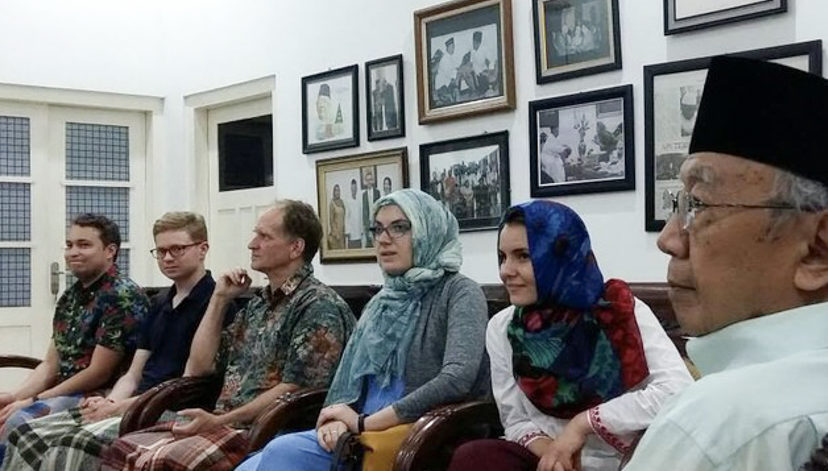King’s Team Navigates Politically-Charged Discussions in Indonesia
In May 2017, Professor Robert Carle, Ph.D., and four King’s College students traveled to East Java on the first King’s International Venture to Indonesia in the midst of extreme political and religious tension.

In May 2017, Professor Robert Carle, Ph.D., and four King’s College students traveled to East Java on the first King’s International Venture to Indonesia. The team arrived in the country a few days after a seismic political event shook the region: on May 9th, Governor Ahok, the Christian governor of Jakarta, was found guilty of blasphemy against the Qur’an and was sentenced to two years in prison. The team from The King’s College stepped off the plane into an atmosphere of palpable religious and political tension.
Indonesia has the largest Muslim population in the world, and since 1945 Indonesia has sought to sustain a culture of peaceful religious pluralism, a political philosophy called “Pancasila.” Governor Ahok’s conviction was a serious test for Indonesia’s aspirations for religious tolerance and freedom of speech, and the harsh sentence sent shock waves through the country. “We have never seen our country so divided,” one of the hosts told Carle upon the team’s arrival. “People are so angry with each other that family members cannot talk to each other or attend each other’s weddings.”
Carle and the team found themselves spending much of their first week in tense discussions about the role of blasphemy laws in Indonesian society. The King’s team opposed the governor’s prosecution, but nearly all of the hosts supported it, and conversations quickly became contentious. Despite this turmoil, the team members proceeded with their plans to explore the Muslim society of East Java, and they sought to have a welcoming attitude toward the people they met.
“We were very intentional about spending an hour every day in Bible study and prayer,” Carle says. “Love is what will draw people to Christ, and we pray to God that we will master the art of showing love.” With this openness of spirit, the team found themselves developing exactly the kinds of friendship they’d prayed for.
As team members developed relationships of trust, they encountered a diversity of opinions about the role of blasphemy laws in a democratic society. As their hosts were arguing that the Christian governor deserved his prison sentence, student groups were performing plays warning against the dangers of radicalization in Indonesia.
The King’s team quickly gained celebrity status in East Java. On May 18, photographs and stories about the team appeared on the websites of major Indonesian newspapers. Carle thanks God for these opportunities, as stories about the team invariably drew attention to questions of religious liberty.
Since returning to the United States, the Indonesia team has been busy preparing for publication articles about their experiences in Indonesia. On June 15, The Media Project published Nicholas Gulley’s (BUS ’17) article, “Christian Governor’s ‘Blasphemy’ Vs. Indonesian Tolerance.” Gulley interviewed Qur’an scholars in Indonesia, and his article contrasts Christian approaches to the Bible with Muslim approaches to the Qur’an. Gulley shows how seemingly arcane theological beliefs precipitated the accusations of blasphemy against the Christian governor.
On June 27, The Media Project published Cassidy Fahey’s (PPE ’17) article about the commitment to serve the poor that the team witnessed among their Muslim hosts. On July 14, The Media Project ran Stuart Clay’s (PPE ’18) article that described how the Islamic boarding schools he visited in Indonesia have built the kinds of tight-knit spiritual communities that Ron Dreher advocates in The Benedict Option. On July 13, Carle had an article on The Public Discourse about how Islamic mysticism (Sufism) is a resource in combating Islamic extremism.
The trip was at once more challenging and more rewarding than any of the team members anticipated. Because of the length of the visit, the students developed deep relationships with their hosts and settled into the rhythm of rural Indonesian life. The closeness of the quarters and the charged political atmosphere in the country brought tensions, but Carle believes that these things also opened up opportunities for honest discussions. He said, “Muslims will never come to Christ as long as Christians fear and hate them. Our venture to Indonesia taught us to love our Muslim neighbors, even in the midst of disagreements. This is perhaps the greatest gift the trip gave us.”
The Indonesia venture was funded by Fieldstead and Company, Inc. and was hosted by the Tebuireng Pesantren in Jombang. The Tebuireng Pesantren is a network of eleven Islamic boarding schools in East Java.




